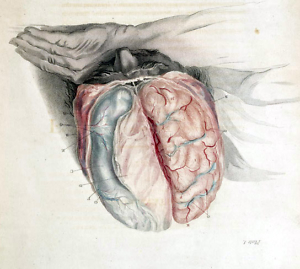Humming
One sound undulated constantly through my father’s life
My father stands at the kitchen counter, reaches for the ballpoint pen with this left hand, clicks it open, then fits the pen into his right hand. He wraps the stiff fingers of his right hand around the pen and begins to scrawl on the paper. His handwriting is spikey and jagged. He stops and starts several times. He winces. When he is almost finished writing, the pen drops from his right hand.
“Well, shit,” he says.
He has to start all over: pick up the pen with his left hand, adjust it into his right hand, grip, start and stop, start and stop.
All the while, he is humming.
*

My father hummed all the time. He hummed while he worked, while he dressed, while he watched TV, even while he slept. I would sometimes hear him turn over in the night from down the hall and a little three-note hum would escape like a snore.
My grandmother told me that the little three-note hum was a habit he developed as a boy. When I studied piano later, I recognized his hum-tune as a perfect inverted major triad. Grandmother said he hummed through his boyhood; evidently, he hummed his way through being the only boy on a working farm in rural East Tennessee with four sisters and a cantankerous father.
Sometimes he would hum a whole song — some Merle Haggard hit from the radio or an old gospel song. If people remarked about it or asked him “What’s that song you’re humming, Tom?” he looked at them blankly. He wasn’t even conscious he was humming.
Humming was a routine, a habit like smoking. He hummed while lighting a cigarette. He hummed as the smoke escaped his nose. He hummed as he ground the cigarette out in the marble ashtray he kept on the end table next to his chair.
*
When my father was 16, he suffered a stroke. It happened when he was at school. Several of his classmates carried him home, and my grandmother made him a sick room near the kitchen. The doctor came late that night and told my grandmother he would not recover, but even if he did, he would not walk again. I am still not sure who was more stubborn, my grandmother or my father, but somehow — after being bedridden for a year — he did recover.
Humming, once again, became his coping mechanism.
*
 People who have researched humming note how often it occurs in creation myths: Humming was the original sound of creation, a vibrating, pulsing energy that gave birth to all things. Many practices, especially in Vedic and Sanskrit traditions, consider humming a potent healing and transformative practice. Modern researchers have documented that humming is like an internal massage. It vibrates our cells, thus possibly strengthening cell and immune health and improving circulation and digestion. Humming may increase our lymphatic circulation and help to clear toxins from the body. These effects can then help to promote an overall feeling of wellbeing. Studies in sonic therapy are now focusing on how humming may benefit those with neurological imbalances such as stroke.
People who have researched humming note how often it occurs in creation myths: Humming was the original sound of creation, a vibrating, pulsing energy that gave birth to all things. Many practices, especially in Vedic and Sanskrit traditions, consider humming a potent healing and transformative practice. Modern researchers have documented that humming is like an internal massage. It vibrates our cells, thus possibly strengthening cell and immune health and improving circulation and digestion. Humming may increase our lymphatic circulation and help to clear toxins from the body. These effects can then help to promote an overall feeling of wellbeing. Studies in sonic therapy are now focusing on how humming may benefit those with neurological imbalances such as stroke.
*
My father’s stroke damaged the left side of his brain, which caused impairments to the right side of his body. His right hand was rigid, his fingers often uncooperative. The two last toes on his right foot “died” and had to be amputated. His right leg dragged stiffly behind him; his limp was pronounced, and he was self-conscious about it.
Humming kept him moving and focused. The more intensely he had to concentrate, the more he hummed. Humming allowed him to pick up a tool and make it do what he wanted it to do without having to think about his disability. Humming was like his cane for walking without tripping. Humming was how he got his right leg to relax enough so that he could bend his knee and put on his pants.
One time my father shut his fingers in the car door. My mother took him to the ER for treatment and stitches. When they got back home, I asked him what had happened that he caught his fingers in the door so violently.
I didn’t tell my fingers to move out of the way quick enough.
His tone was edgy. He limped past me gruffly. My mother flashed me the look which meant to shut up about it. Other than to occasionally refer to himself as crippled, my father almost never talked about the complications of his disability. His short-tempered explanation, however, made me understand that he always had to “tell” his hand or “command” his arm or leg to move in the way he wanted. Perhaps his brain had been so damaged that the automatic reflex for movement away from danger was gone. So, if he wanted to keep his fingers out of a car door, he had to complete an intricate mental process to be successful.
*
Some studies in sound therapy and in the healing beliefs of humming are focused on how humming may release endorphins and create new neural pathways in the brain, perhaps even the ability to create neuro-genesis — new cells in the brain. Musician and teacher Jonathan Goldman claims in his book The Humming Effect that humming acts as a triggering mechanism for the manifestation of our conscious intentions.
Of course, my father never could have read a book like that. His stroke had also caused mild dyslexia. But wasn’t this the reason why he hummed while he struggled to read the newspaper every evening or when he worked on his car or signed his name? Maybe the mental and physical brute force it took for him to operate through trauma and infirmity could only be accomplished by the self-soothing vibrations of humming. Humming was the one sound that undulated constantly through his whole life. It flowed through him and pulsed through the rooms of our small house. The memory of his melodies lives in me like a quaver.

Copyright © 2021 by Marianne Worthington. All rights reserved. Marianne Worthington is a poet, editor, and cofounder of Still: The Journal. Her work has appeared in Oxford American, CALYX, Grist, and other outlets. She is coeditor, with Silas House, of Piano in a Sycamore: Writing Lessons from the Appalachian Writers’ Workshop. She grew up in Knoxville and currently lives in southeastern Kentucky.

